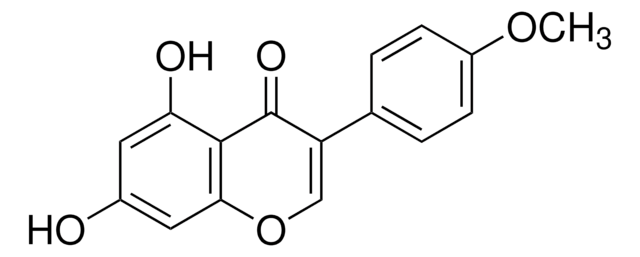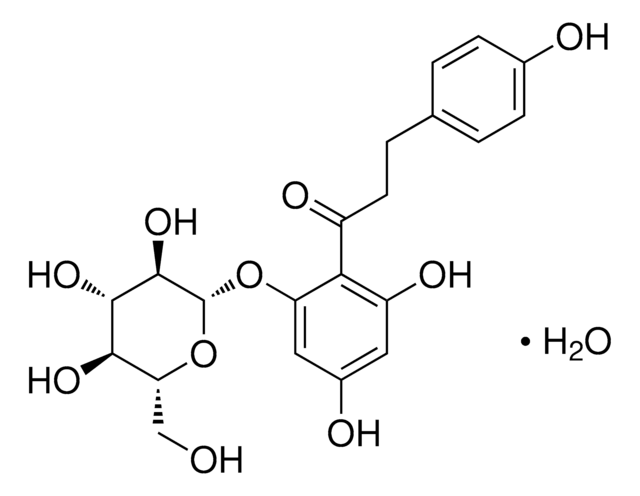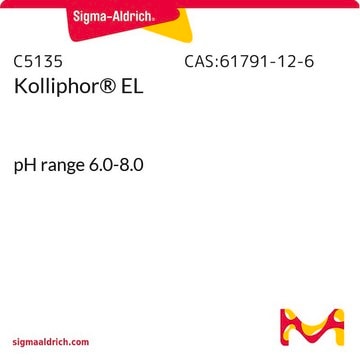D5318
DCP-LA
≥95% (HPLC), oil
Synonym(s):
2-[(2-pentylcyclopropyl)methyl]cyclopropaneoctanoic acid, 8-[2-(2-pentyl-cyclopropylmethyl)-cyclopropyl]-octanoic acid, FR 236924
Sign Into View Organizational & Contract Pricing
All Photos(1)
About This Item
Empirical Formula (Hill Notation):
C20H36O2
CAS Number:
Molecular Weight:
308.50
MDL number:
UNSPSC Code:
12352200
PubChem Substance ID:
NACRES:
NA.77
Recommended Products
Quality Level
Assay
≥95% (HPLC)
form
oil
color
clear
solubility
DMSO: >2 mg/mL
storage temp.
2-8°C
SMILES string
CCCCCC1CC1CC2CC2CCCCCCCC(O)=O
InChI
1S/C20H36O2/c1-2-3-7-10-16-13-18(16)15-19-14-17(19)11-8-5-4-6-9-12-20(21)22/h16-19H,2-15H2,1H3,(H,21,22)
InChI key
CONYTTFKIUJZOF-UHFFFAOYSA-N
Biochem/physiol Actions
DCP-LA is a selective PKC-epsilon (PKC-ε) activator. In the in situ PKC assay with a reversed phase high-performance liquid chromatography, DCP-LA significantly activated PKC in PC-12 cells in a concentration (10 nM-100 μM)-dependent manner, with the maximal effect at 100 nM. DCP-LA has over a 7-fold greater potency for activation of PKC-ε over other PKC isozymes.
Features and Benefits
This compound is featured on the PKC page of the Handbook of Receptor Classification and Signal Transduction. To browse other handbook pages, click here.
Storage Class Code
11 - Combustible Solids
WGK
WGK 3
Flash Point(F)
Not applicable
Flash Point(C)
Not applicable
Personal Protective Equipment
dust mask type N95 (US), Eyeshields, Gloves
Choose from one of the most recent versions:
Already Own This Product?
Find documentation for the products that you have recently purchased in the Document Library.
Takeshi Kanno et al.
Journal of lipid research, 47(6), 1146-1156 (2006-03-08)
This study examined the effect of 8-[2-(2-pentyl-cyclopropylmethyl)-cyclopropyl]-octanoic acid (DCP-LA), a newly synthesized linoleic acid derivative with cyclopropane rings instead of cis-double bonds, on protein kinase C (PKC) activity. In the in situ PKC assay with reverse-phase high-performance liquid chromatography, DCP-LA
Takahiro Yaguchi et al.
Neuroreport, 17(1), 105-108 (2005-12-20)
In the water-maze test, the linoleic acid derivative, 8-[2-(2-pentyl-cyclopropylmethyl)-cyclopropyl]-octanoic acid (DCP-LA) (1 mg/kg, intraperitoneally), significantly shortened the prolonged latency for accelerated-senescence-prone mice 8 (SAMP8), reaching a level similar to the latency for accelerated-senescence-resistant mice 1 (SAMR1) as control. In the
Joshua H K Tam et al.
PloS one, 11(10), e0161445-e0161445 (2016-10-25)
The amyloid hypothesis posits that the production of β-amyloid (Aβ) aggregates leads to neurodegeneration and cognitive decline associated with AD. Aβ is produced by sequential cleavage of the amyloid precursor protein (APP) by β- and γ-secretase. While nascent APP is
Ling-Yu Qiu et al.
Molecular medicine reports, 16(3), 2953-2961 (2017-07-06)
Anion exchanger 3 (AE3) is known to serve crucial roles in maintaining intracellular chloride homeostasis by facilitating the reversible electroneutral exchange of Cl‑ for HCO3‑ across the plasma membrane. Our previous studies reported that sasanquasaponin (SQS) can inhibit hypoxia/reoxygenation (H/R)‑induced
Our team of scientists has experience in all areas of research including Life Science, Material Science, Chemical Synthesis, Chromatography, Analytical and many others.
Contact Technical Service








